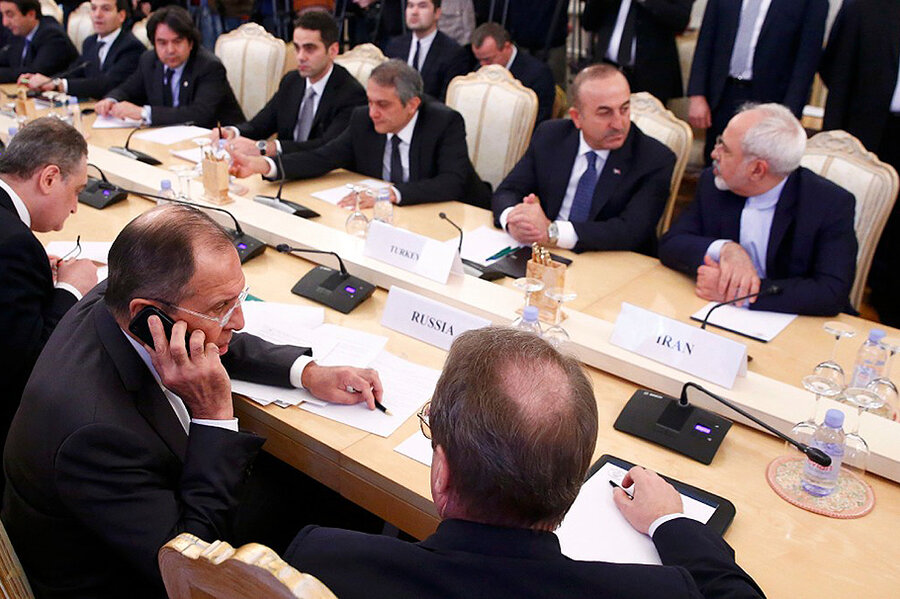'Moscow Declaration' lays out vision for Syrian peace deal, with US on sidelines
Loading...
Leaders of Russia, Turkey, and Iran held talks in Moscow on Tuesday in the first step toward brokering a peace deal in Syria, emerging with a declaration of principles that they said should govern any agreement backed by the three countries.
Russian Foreign Minister Sergey Lavrov said afterward that the trio’s plans for a Syria-wide ceasefire – excluding the self-proclaimed Islamic State and al-Qaeda’s Syrian branch – stood a better chance than previous negotiations.
"The format you see today is the most efficient one," Mr. Lavrov said, according to the Associated Press, referring to the group of countries involved in the talks. "It's not an attempt to cast a shadow on the efforts taken by our other partners, it's just stating the facts."
The United States downplayed its absence from the talks, with State Department spokesman John Kirby telling the AP, “We are not excluded, we are not being sidelined” from the peace process.
But the meeting seemed to mark a significant shift in the countries brokering the Syrian conflict, seating Russia in firmer command and sounding out the depth of the Obama White House’s reluctance to more aggressively engage.
Russian Defense Minister Sergei Shoigu, who called the agreement the "Moscow Declaration," said that only Russia’s backing had been able to make a real difference in the conflict.
"All previous attempts by the United States and its partners to agree on coordinated actions were doomed to failure," Mr. Shoigu said, according to Reuters. "None of them wielded real influence over the situation on the ground."
Mr. Lavrov pointed to an ongoing evacuation of civilians and rebels from Aleppo, brokered by Russia and Turkey, as proof of the alliance’s effectiveness, reported the AP.
"More than any others, our states are ready to help the settlement with real deeds and not just words," he said.
The talks come a little over a week after the Syrian city of Aleppo fell to the Russia- and Iran-backed government of Bashar al-Assad, in what The Christian Science Monitor’s Scott Peterson described as a “retooling of power dynamics in the Middle East,” as Iran builds resistance against the US, Israel, and their allies, and Russia tries to restore influence over the region:
“This is what really matters to Iran and Russia, that the political, geo-strategic project of the anti-Assad and anti-Iranian position has failed, and it has been buried in the Aleppo rubble,” says Fawaz Gerges, a Middle East expert at the London School of Economics and author of “ISIS: A History.”
“Syria really could be a signpost for the emergence of a new international system,” says Mr. Gerges. President Obama made a decision “not to involve, not to entangle, not to invest major political and military capital” in the Middle East.
“It’s not the lack of capability, it’s the lack of will,” says Gerges, noting frequent administration statements about ending US wars in Iraq and Afghanistan, and no desire to start new ones. “In contrast, [Russian President Vladimir] Putin has made a strategic investment, and so far the returns are excellent.”
The three brokers are not without their differences: Turkey, unlike Russia and Iran, has long said that Dr. Assad should step down, for example. On Tuesday, Turkey’s foreign minister said that the need for all parties to stop sponsoring “terrorists” should apply to Hezbollah, a close ally of both Iran and the Syrian government. But the Moscow meeting may suggest that Turkey could back off its support for Syrian rebels in exchange for a longer leash in fighting Kurds in territory they hold near the border – a priority for Turkey’s government.
Dmitry Peskov, a spokesman for Russian president Vladimir Putin, told the AP that the assassination of ambassador Andrei Karlov in Turkey on Monday was a vain attempt to “drive a wedge between Russia and Turkey,” adding that the two countries would cooperate even closer.
This article contains material from the Associated Press and Reuters.








